- Home
- Norman Mailer
Ancient Evenings Page 10
Ancient Evenings Read online
Page 10
“No, nephew,” said Set, “there We will be surrounded, and never speak alone. Come to My camp. I am deserted, and You will spare Me the company of silence.”
Affected by these sad words, Horus departed with Set, and They walked side by side down all the distance to the uncle’s camp, and Set slaughtered one of His captive boars and They roasted the carcass into the evening, drinking Their meat down with wine pressed from the grapes that grew in the blood of the devoured thieves. By the campfire, They paid great compliments back and forth, and spoke of the other’s great skill in combat. Finally, Set made a speech to the spirit of wine. “Some,” He said, “crush the grape with a wine-press, but I want my slaves to step on the grapes with their feet. For nobody has more desire to travel than a slave, and this wish gives flight to the spirit of the grape.” He raised His glass. “My wine will make You ready to do what You have never done,” and Horus applauded, and They drank a final toast, and fell asleep by the fire.
Out of this slumber, Set came awake with the memory of His erection on the first day of battle, and He fondled His nephew’s scrotum and tickled His backbone, and swore He would try to proceed no further. False vow. There is no rest at this place. Set remembered how His phallus had been ready to enter the bowels of His nephew, and that pumped Him up with the sweetest stinks, and He was full of greed.
Horus tried to stay asleep. The drops of gazelle’s milk that He had swallowed had put Him into the happiest tolerance and bliss, just the state in which to receive a few caresses. He was certainly getting ready to learn how much of Himself could be entered by another. What a nice balance that would give to the fires of His victory.
Set, however, was shaking to find Himself so close to the flesh of the son of Osiris. Set was squalling like a boar. The smell of the boy’s cheeks had Him wild. A spew of curses on the milk of Isis and the crotch of Osiris came out of His mouth with such a caterwauling of dead thieves’ screams that Horus saw before Him the sad eyes of Isis in the head of Hathor and freed His sphincter, and caught the semen in His hand, while Set, with a blind cry of exultation, crashed into sleep and the deepest snore.
Horus, befuddled from drinking thieves’ wine on top of gazelle’s milk, forgot at once what had happened. Much too generously had Isis bathed His eyes. The milk left Him with every docility of a fool. He went wandering out of Set’s camp with His wet hand held before Him as if pearls had collected there, and moonlight was on His face. He had not gone a hundred steps before He met His mother.
Isis had been waiting all night at the outskirts of Set’s camp. She knew the weakness of Her husband when it came to understanding His brother. Bathing the moonlight with Her silent prayers, She had been sending Her words of power into the swamp to roll like mist over Set.
“But how little,” said Menenhetet, “can magic offer when the heart of the magician is heavy with fear? It is the first paradox of magic, and the worst, that it is always least available when we are most desperate. On this night, Isis was working within a cow’s head not yet familiar to Herself. How could She measure the potency of a curse when instead of widening a delicate nostril, She now had to revolve a nose as large as a snout? With such unfamiliar instruments, the question is whether She was able to affect anything that night, at least until the moment She did. But, finally, She did. How else account for Set’s stupidity in so exploding, oink, oink,” said Menenhetet, “that He fell asleep without knowing His semen was left in the enemy’s hand. Can you believe it? He dreamed that His seed was taking knowledge, drop by drop, of the secret turns of Horus’ bowels. I can promise you that Set snored with raucous expectation of orgies of possession in years to come. He was certain that Horus could now keep no secret imparted to Him by Osiris. Sweet dreams!” said Menenhetet. “Isis took one look at the hand of Her son, and exclaimed, ‘The seed of Set is as dense as milk of silver,’ and all of Set that had collected in the palm of Horus now was heavy, and brilliant like the moon. That liquid silver became our first ball of mercury, no more (and no less!) than a distillation of the seed of Set. Isis, now in full recovery of Her wisdom, encouraged Horus to throw this gout of mercury into the swamp even if every weed in the marsh must turn poisonous. On the consequence, our native Egyptians, eating the meat of beasts who graze upon these weeds, have turned as spineless as mercury in their will, and so we are reduced from a great nation into one without character, yes, every ejaculation of our Gods that is not left in the body of another is the birth of a new disease. Much of Maat resides in this stern principle. Otherwise, Gods could sow Their seed everywhere.”
He took a breath and smiled. “Be certain that when Horus threw the milk of silver into the swamp, it took the skin of His hand along. Isis gave Him a new palm, however, by rubbing the sore flesh of His fingers in the liquor of Her thighs and that proved as beneficent as the milk of the gazelle—although we will not pause over such a caress. Indeed, I mention the gesture only to assure you that Horus was so excited by the velvet of His new skin that He promptly ejaculated into it, and such an outpouring, as He was told at once by His mother, would prove precious in a little while.”
Menenhetet nodded, even as I watched Isis lead Horus back to the camp of Set. Passing His snoring body, full of its harsh and carnal dreams, They wandered into the garden where lettuce now grew in abundance. Horus assured Her that during the feast of wild boar, Set had often stuffed just such a head of lettuce into His throat, and half-choking, eyes bulging, jaws near dislocated, had crushed the leaves, and swallowed it whole. (“No one,” said Horus, “can eat lettuce in a manner equal to Set.”) Now, at a sign from Isis, He cast the semen in His hand all over this field and it fell in many threads, and subtle sounds were uttered, altogether a curious music. Those long liquid strings shook with the life of the living, which is to say, all the shock of wars to come, even the sounds of horns and trumpets not yet blown. A sigh of music also came to Isis and Horus out on the edge of the field, but it was only the subtle murmur raised by the legs of an army of spiders who left the garden after the intrusion of Horus’ threads upon their webs. How the moonlight glittered. On the way home, Isis sang lullabies to Horus. “His development to manhood,” said Menenhetet, “has obviously been uneven, but two events occurred by morning. Set awakened and gobbled more lettuce, and Horus became Isis’ lover.”
When he saw how much interest arose in me at this remark, my great-grandfather held up his hand. “Of this affair, I will say a little, but only when we are done. For now it is enough to know that Horus was wise by morning, and Set stirred in His bed with all the pride of one who has made a conquest the night before. On His loins, He could smell the shame of Horus’ cheeks, and it mixed nicely with His own pride. So Set made great plans. Before Ra had even risen into the full height of noon, Set called the Gods together.
“Assembled in haste, and curious in the extreme, They heard a powerful speech. Set had put on robes of red, brighter than His skin, and in a voice of fire, He said, ‘On the day that Horus and I made battle, victory should have been Mine. His head was in the mud. But by the use of My lost thumb, He slipped out of My grip—a trick taught by His mother. He has blood like the milk of His mother. From that moment, no test was left but theft. You saw it. Yesterday, His Father—who pretends to be My judge—commanded Us to go away and feast. We did. Now, I tell You, I am the victor. For in the night, I rode in glory upon His back, and I was as large as the tree that grows from the nut. The flood that rose out of My loins was emptied into the contemptible backhole of the boy Horus standing here beside Me. May I say He bleated like a sheep and cooed like a pigeon. He was My possession. So I say: Do not make Him the Lord of the Living, or I will steal a secret each time I enter His bowels. It is better when great powers are given to the strong. Let Horus serve as My assistant. His hips are weak.’
“Set expected Horus to attack, and was ready. But Horus only threw back His head and laughed. To the judges, He said, ‘I have listened with a good and happy heart. My uncle is a thin little man with
a loud voice. He squawks like a bird. He lies. It is I who had the onus of traveling up His withered crack, and I did it for nothing better to do. Try for all of one night, My judges, to listen to My uncle’s farts. I confess that I would have done better to hurl a spear into a swamp. Old men are dirty.’
“How much Horus had learned in His night with Isis! The oil of Her thighs must have offered more than the milk of the gazelle. Set had no recourse. He drew His sword. Horus, nimbly, darted away, and at a sign from Osiris, the warriors of the court held Set.
“In a bright, clear voice, Horus said, ‘Let the Gods summon Our seed from last night. Let the seed tell Who speaks the truth.’ Assent came from Set as quickly as from the others, and Thoth was ordered to stand between the disputants. ‘Put Your hand upon the buttocks of Horus,’ Osiris commanded, ‘and ask the voice that is in the semen of Set to declare itself.’ Osiris’ own voice was not confident. He doubted His son.
“ ‘I speak,’ said Thoth, ‘to this seed of Set. Tell Us where you are. Speak from the place where you find yourself.’ In the distance, out of the swamps, came a loud and heavy croaking of mercury. The full pestilence of the weeds was in the air, and the Gods murmured that the semen of Set—foul stuff!—must have been ejaculated into the swamp.
Then Thoth put His hand on the hips of Set, that is, so far as He dared, for Set was shaking with rage, but Thoth proceeded to make the same speech to the semen of Horus. Would it appear? A voice flew right out of Set’s buttocks. It was a full, sweet-smelling wind, and it said, ‘I am the transformation of the seed of Horus.’ This wind smelled sweet as lettuce. The Gods roared. For They knew Horus had buggered Set.
“It would not have been over, and Set might have plotted another revenge, but on His return to camp, le found out He was pregnant. A God may conceive a child by His mouth, or His anus, but if we know it was here by way of the mouth, Set did not. A miserable pregnancy! The creature was born half-man, half-woman, and soon died in the suffocations of attempting to make love to Itself. Set still serves as the Lord of Lightning and the God of Thunder, but He is bewildered, a heavy and near-motionless God who cannot be certain whether He told the truth, or was, indeed, buggered. So He is now mad. It is more difficult for a God to know peace of mind than a man.” Menenhetet sighed. With a sense of movement as deliberate and concentrated as an old hag untying a cloth of many knots, he rose, move by move, flexing one joint into another through a series of gestures forward and back until he was standing on his feet. “Are you ready?” he asked.
“You still have not spoken of the affair of Isis and Horus.”
“Nor should I. They remain among the most powerful of Them.”
“Yet I must know more. What if I encounter a God in the Land of the Dead?”
“You will not. They live in the summits. You do not know a God until you have seen a great mountain.” He sighed again. “Let me say that Isis and Horus had a long affair. It still continues. I whisper to you that cohabiting with Her son keeps the form of fidelity to Osiris. So He is calm, and blesses Them. Her act does not strip Him of honor, but maintains the stability of Their family. And the affair has given Horus much wisdom which He needs as Lord of the Living. It has also given Isis more satisfaction than a Goddess with the head of a cow can rightfully expect when She copulates with a hawk. For it is the shape of that fierce bird Horus has chosen for Himself. Now, He need never fear His weak legs, and every Pharaoh worships His wings. I can say that the God Horus, fully grown, is not at all like the boy, and has become as great as His Father. Such is the extent of the knowledge He has received from Isis.”
Now, my great-grandfather beckoned to me. “It is time to begin our travels in Khert-Neter,” he said. “Are you ready?”
I felt a childish fear of every force beyond the door of this tomb. Yet there was nothing to do but nod.
When we went out into the night, Menenhetet clapped his hands. Doubtless he wanted to signify the end of one spell and the commencement of another. I waited, but only the stench from his breath was remarkable. We were back in our alley of the Necropolis.
III
THE BOOK OF THE CHILD
ONE
Our way brought us back to the Pyramid of Khufu. It was hard to pretend I felt calm. My fear of all that was yet to come now lay on me like a slab of stone, and the sight of the Great Pyramid did not reduce my turmoil. With each of Menenhetet’s steps I felt more woe for he walked ahead of me with the quick pace of someone trying to escape a bad odor, and I remembered the grave robber who fled as I approached the door to my tomb. He had loathed my breath even as I had detested his—a sign the wretch was in another realm than my own. But if this were true, what conclusion should I draw about Menenhetet and myself?
Could he be my Khaibit? That was a thought to leave its echo! My Shadow? Who could be more at odds than the Khaibit and the Ka? The Ka might be one’s last poor means of continuing to exist, but it could not bear the weight of much memory. The Khaibit, however, knew all that had happened to you. So it could distort what the Ka did remember. An instrument for evil!
This conviction that Menenhetet was my Shadow came on me with such force that I was about to ask, “Are you the Khaibit of Menenhetet Two?” but did not from the fear that he would only confuse me further by some such remark as, “No, you are the Ka of Menenhetet One and I am the Khaibit.”
So I did not speak, and only continued to travel behind him at his quick rate. It must be said he moved like my guide, his white robe wrapped about him in disdain for casual contact with beggars or bats, yes, everything in his posture spoke of a servant who leads his guest, and will not suffer any distracting encounter. Even as we emerged from the Necropolis, a man was standing at the gate with his palm open, a beggar’s palm with no fingers. Not missing a stride, Menenhetet struck him a sharp slap on the arm to make it clear no approach would be tolerated. Indeed, the man flinched as we passed, and I realized I must look like a noble to him.
But then I had not contemplated my clothes until now. When had I first come to wear these clean white pleats, this jeweled breastplate? A memory returned of a promenade taken by the banks of the Nile, and multitudes bowing before me. The picture was so clear as for me to believe it, and my pleasure was not unlike the satisfaction I had just known before the respect of the beggar. Warmed by such tokens, my mood took a quick turn for the worse, however, so soon as I began to ponder my great-grandfather’s remarks about Horus and Set, for I had to suppose that Menenhetet, given the occasion, would try—put no fine word on it—to bugger me. The quiet arrogance of the old man that he could bring off such a feat was curious. I did not know whether to think of him as laughable. After all, the muscles of my hips spoke of pride—nothing was broken in my back. Even as we walked, I felt quietly of my arms and legs and was reassured. My means might be one-seventh of what once it had been, but I still did not see how that foul old man could be the first to take carnal ownership of me. I was remembering how my friends and myself used to think of ourselves as virgin to other men until some fellow was brave enough to grab us from the rear. Of course, once your body was broken into by another, that was a true turning. An aristocrat would allow himself to be used in such a way but once, as if, truth, we had one royal flower to offer. We were determined that no one we did not admire in every way could even begin our seduction. Some of us went on in such chastity for years. That could become a vice. One might grow into a spinster who has waited too long and so is vulnerable to any passing lout. The balance of Maat is in the choice.
Now I wondered if I had been one of those who waited too long. What a horror if Menenhetet One became the first. No, not conceivable, I thought, not as I watched him walk before me in a flapping old man’s step, his head covered against a chill although it was a warm night. Nonetheless, he did not move altogether like an old man.
I was uneasy. We were now near the foot of the Pyramid of Khufu, and as though my reluctance to go on was evident, Menenhetet came to rest and began to speak again, a
lthough I could hardly listen. His breath was so mingled with mine. I do not know what he sniffed in my throat, but I thought I had stepped into the scalding odor of urine. It was like a cave of bats—a fair guide to the corruptions of the Duad. Yet in the act of suffering his fumes, so was I delivered of the worst of them. His breath was now endurable, and not much worse than old garlic and old teeth.
“The common entrance to the Duad,” he said, as he shivered in the warm moonlight, “is far beyond the First Cataract—a long journey, and not the route for us. We will go in by way of a cave that can be found in the sky.”
I would never have understood this last remark if the Pyramid had not been there before us, but in the moonlight these limestone slopes were gleaming bright as marble, and their shadows looked dark as velvet. I remembered the chamber of Khufu in the center of this Great Pyramid. Was that a cave in the sky by which I had once been ready to enter the Duad, and by myself? Had I taken the wrong turning? But I had no taste for such questions.
Menenhetet was speaking, meanwhile, about matters so trivial I hardly listened. It was something about a Hebrew slave he had kept, and curious customs among the Hebrews. “They are demented,” said Menenhetet, “and happy to remain shepherds. They do best when talking to themselves in the hills. Nonetheless, I have observed that barbaric people, like beasts, live closer than we do to their Gods. As an example,” he said, and in truth his voice was calming the weakness of my body, “I remember the odd language of this Hebrew slave. At first I thought it a dialect spoken by an imbecile since he did not seem to have any notion of yesterday or tomorrow in anything he said. Yet he must have had a hundred words for cut, and used one for slicing reeds, another for meat, or fowl, and separate kinds of fruit, not to speak of chopping down a tree, or cutting off a hand, not stupid at all when you think that everything we cut has its spirit severed most abruptly. A good word does well to propitiate the pain. No, we would not,” mused Menenhetet, “wish to dispatch each of our enemies with the same cry. So, the variety of these words led me to study that shepherd’s language, and I began to see enigmas in his tongue. The Hebrews, I discovered, live with what is before them at every instant—their words reflect such a simple condition. ‘I eat,’ they say. Simple! But when they wish to speak of what is not before them now, why then you cannot tell (unless you know the trick of the language) whether they are speaking of what is past, or what is yet to come. It seems the same in the way they say it. They tell you, for example, ‘I ate,’ and you won’t know whether they have finished the meal or are going to eat in a while, not unless you listen so carefully as to realize they actually said, ‘And I ate.’ That means: they will eat. They know how peculiar time can be! And on their thick tongues! Conceive of it! How can we be certain that what we say we will do tomorrow has not in truth taken place yesterday, although we cannot quite remember since it was in a dream. So do not,” said Menenhetet, touching me gently by the shoulder, “feel too weak before what is to come. It could have happened to you already. Yes, dear son of my dear granddaughter, Hathfertiti, your terror may have more dignity than you know. It might belong to the remorse of your past rather than tell you of some unendurable torture to come.”

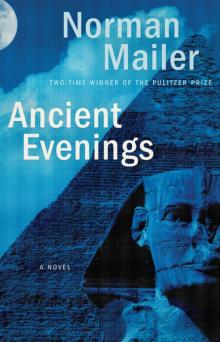 Ancient Evenings
Ancient Evenings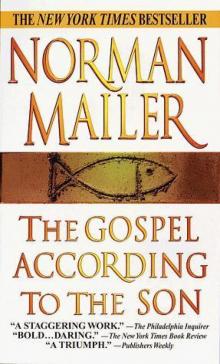 The Gospel According to the Son
The Gospel According to the Son Oswald's Tale: An American Mystery
Oswald's Tale: An American Mystery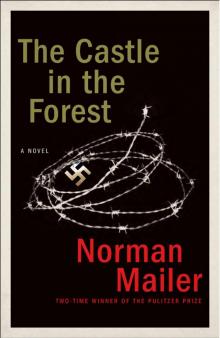 The Castle in the Forest
The Castle in the Forest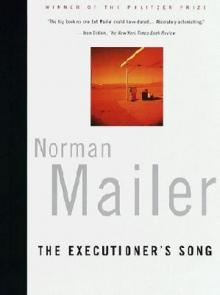 The Executioner's Song
The Executioner's Song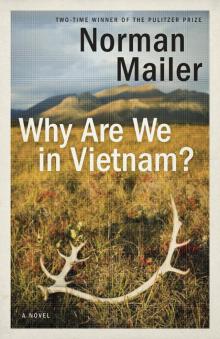 Why Are We in Vietnam?
Why Are We in Vietnam? The Deer Park: A Play
The Deer Park: A Play An American Dream
An American Dream Why Are We at War?
Why Are We at War? The Time of Her Time
The Time of Her Time The Spooky Art: Thoughts on Writing
The Spooky Art: Thoughts on Writing Miami and the Siege of Chicago
Miami and the Siege of Chicago Mind of an Outlaw: Selected Essays
Mind of an Outlaw: Selected Essays Barbary Shore
Barbary Shore The Fight
The Fight Harlot's Ghost
Harlot's Ghost Tough Guys Don't Dance
Tough Guys Don't Dance Of a Fire on the Moon
Of a Fire on the Moon The Spooky Art
The Spooky Art The Deer Park
The Deer Park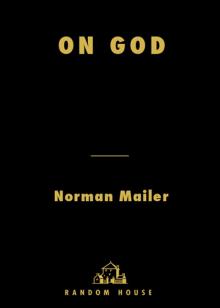 On God: An Uncommon Conversation
On God: An Uncommon Conversation Mind of an Outlaw
Mind of an Outlaw Oswald's Tale
Oswald's Tale